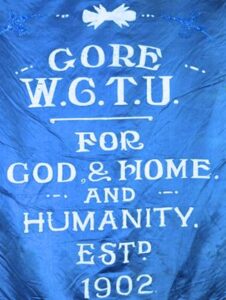1884: Gore Gospel Temperance Society
May 15, 2023
By AHNZ

New Zealand has had several waves of temperance and, believe it or not, they’re far from finished. The Wokesters of their day also created the ‘Me Too’ of their day, the Suffragettes. They persecuted the working folk by going after their drug of choice.
This banner (image left) comes from the Gore Woman’s Gospel Temperance Union. Formed in 1902 these women apparently felt the need to distinguish themselves from the much older Gore Gospel Temperance Society which first appears in newspapers in 1884. Ref. Southland Times, Papers Past
The use of alcohol as a proxy war between factions goes back even further. Protestants and Catholics were discriminating against each other over whisky back in the late 1700s too.
Earlier still the rule of William III in the 1600s divided the Catholics and Protestants along which type of alcohol they consumed. Beer? Gin? Brandy? It’s a step up from barbarism to persecute one another in a civil war using a proxy drug war rather than conventional war or burning each other at the stake.
So this 1891 card (ref. History Geek Collection) is part of that constant war of the West that was imported to New Zealand along with the rest of the culture. It was at about the same time that the Salvation Army became powerful and their international hero, General Booth, visited this country several times. Ref. 1899: A General Inspection, AHNZ
It’s not over yet! The working class people who protested the COVID Mandate at parliament in 2022 were a new version of the old out-group. Their ancestors (espec. Irish) would have been the goldfields diggers in the 1860s with dozens of hotels and pubs and drink; The Temperance Woke came to take them out. Their ancestors would have led the Peasants Revolt of 1381 against King Richard II that bares so much resemblance to the Freedom Convoy and Freedom Camp. Ref. 2022: The Peasants’ Revolt, AHNZ
As recently as 2022 the Green MP Chloe Swarbrick made herself the latest in a long line of politicians seeking success via attacking alcohol culture. It proved not to be fertile ground in this case and fizzled out. In the 1890s, on the other hand, Booze Bullying was so politically lucritive that New Zealand’s top 2 political powerhouses (Seddon and Stout) battled it out to show off which of them would be harder prohibitionist leader! “Robert had not mentioned it in his recent buy-election campaign but Richard Seddon met the attack with liquor controlling legislation of his own so that a duel ensued as to who the better booze bully was!” – 1898: Getting Rid of Robert and Anna Stout, AHNZ
Banning booze in sports: Can Green MP get support for her alcohol reforms? – NZ Herald (2022)
“This entailed bossy Women’s Christian Temperance Union banging on about vice and trying hard to force prohibition upon everyone. New Zealand was flooded with prohibition tracts, novels, reciters, prayer-books. Our two main contenders for Prime Minister, Richard Seddon and Robert Stout dueled it out over who had the more popular liquor-licencing law. The oppression had become great, toxic even, and people were looking for a relief and a change.” – 1890: The Students of Truth, AHNZ
“Pubs have been the cornerstone of British social life for at least a thousand years. History books may be full of kings, queens, politics and wars, but the real history of Britain- the history of the vast majority of the population- happened in and around the pub…For much of our history, the pub was the single focal point of our social lives. Anything we wanted to do, from playing games to meeting future spouses, we did there.” – The Pub, Pete Brown (2016)
“These many hotels and pubs served as community hubs, a networking and administrative center…At the end of the century this sort of community structure became under attack. The same thing had happened back in Britain in the 1830s and would do so again in New Zealand’s 1910s.” – 1866: Charleston, AHNZ
I’m sure there are plenty of books by authors who have figured this out before me and written a history of the West through alcohol. I’ve yet to find one but I’d be very interested in reading one.
All of New Zealand was in the midst of an Awakening era in the 1880s. A new generation had grown up feeling safe and protected in a land tamed and made productive by those who had gone before. They took security and plenty for granted to chase after morally superior positions. The Vogel Boomer generation were eager to find spiritual, moral, things they could finger-wag their elders over.
Why was Gore one of these hot spots for the ‘Gosepl’ and ‘Women’ braned attacks on drink? It had been a booming pastoral cross-roads economy that, by the 1880s, had become successful based on the culture of men who met and planned in hotels/pubs. The success now brought rail, banks, newspapers, and other civilisational upgrades. Only then was it a safe habitat with the easy-living conveniences to support a Wokester colony. This counter-culture sprang up and, of course, ungratefully, attacked the elder pioneeirs for being who they were. The pressure point, of course, was not hard-working or that they met in hotels/pubs to organise and deal and contract and exchange information. To penetrate and undermine that ‘boys club’ was the aim but the means was to attack the alcohol aspect that was really part of the bundle of institutions despised by the zealot. Gore had plenty of this sort of culture to attack and exploit. Thus, in its suffering, Gore fed the Wokesters who were able to feel rightious and take power for themselves in the name of something percieved as moral.
If Gore’s publicity about various illicit bush breweries is to be believed then that would be a counter-counter-culture to the Wokesters success.
—
Image ref. Gore Women’s Christian Temperance Union, Gore Historical Museum, NZ Museums; AHNZ mod
 Like Comment Share
Like Comment Share





